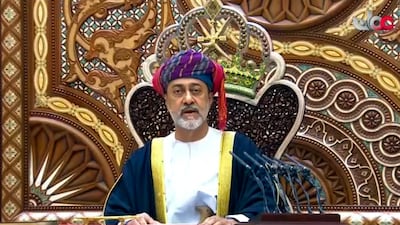The Sultan of Oman has restructured the government in a series of decrees made on Tuesday.
Sultan Haitham bin Tariq, who came to power in January after the death of long-time ruler Sultan Qaboos, issued 28 royal decrees, creating new ministries and renaming or merging others.
Badr bin Hamad Al Busaidi becomes foreign minister, taking over from Yusuf bin Alawi the veteran minister who had served in the role since 1997. Sultan bin Salem bin Saeed Al Habsi becomes finance minister.
The roles were also adjusted from previously being ministers responsible for foreign affairs and for financial affairs, with their portfolios no longer directly overseen by the Sultan.
Ali Sunaidi, the Minister of Trade, made way for Qais Al Yusuf, former Chamber of Commerce President. Two female ministers also joined the Cabinet, bringing the total to five – the most ever in Omani leadership. Rahma Al Mahrooki replaced Rawya Al Busaidi as Minister of Higher Education and Laila Al Najar takes over the Ministry of Social Development.
New ministries to be created
The country now has a number of new ministries, including a Ministry of Culture, Sports and Youth, Ministry of Labour, Ministry of Economy and Ministry of Transport, Communications and Information Technology.
Sultan Haitham's son, Dhilyazen bin Haitham, will head the new Ministry of Culture, Sports and Youth.
Other departments have been merged, including the Ministry of Justice and the Ministry of Legal Affairs under the new title of the Ministry of Justice and Legal Affairs.
The Ministry of Agriculture and Fisheries was changed to the Ministry of Agricultural, Fisheries and Water Resources.
Sultan Haitham has gradually made changes since his leadership began, but Tuesday's restructuring is the most significant yet.
"We have been expecting the cabinet changes for a while. it has not surprised us," Abdulhafidh Al Saifi, a retired economics professor, told The National. "They are good changes and much needed especially now we going through a bad patch economically," he said.
Some analysts said the reshuffle was in line with the changes planned as part of Oman's Vision 2040.
Sultan Haitham leads the main committee of Vision 2040, the government’s strategy to diversify the economy away from oil.
"Part of the transformation programme required for the 2040 was to revamp the state apparatus," public policy analyst Ahmed Al Mukhaini told The National.
Others welcomed the retirement of old ministers who served for almost three decades.
"When you served the government for that long, you have nothing more to give. The Sultan is doing the right thing to replace new blood in the cabinet who will inject new ideas into the economy and social developments," said Hashar Al Hadeedi, a PhD scholar at University of Leeds.

